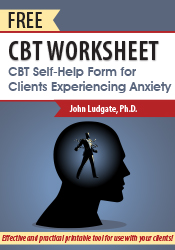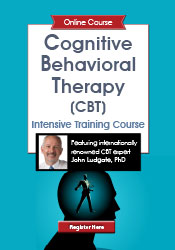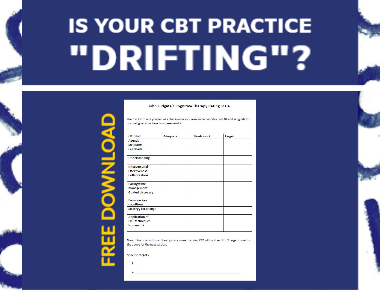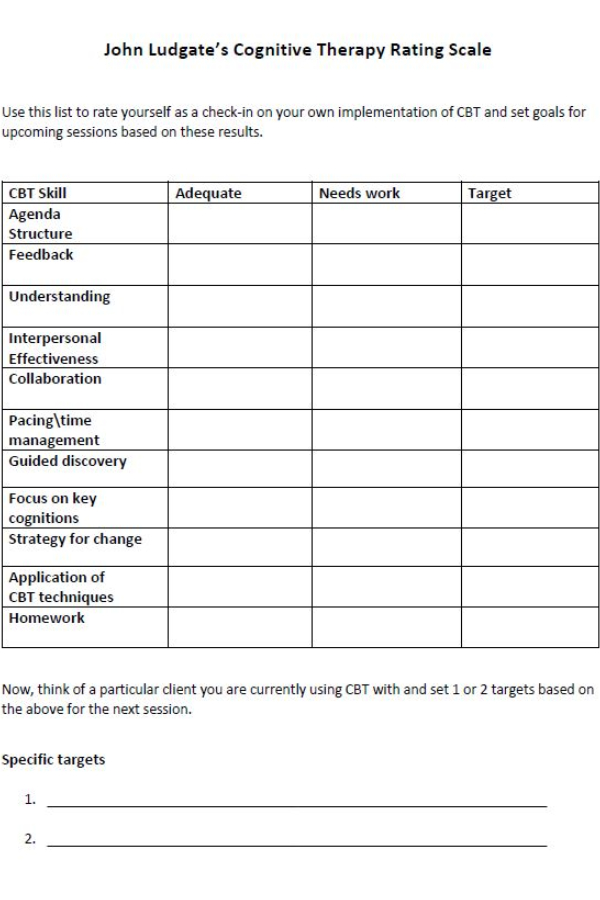Are you practicing CBT to the best of your ability?
Discover tools and assessments to help determine if your CBT practice is “drifting”

One could say that, over time in practice, therapists become more confident in their skills and how to apply them… But research shows they may actually be practicing the therapy with less fidelity to the model overall.
It might be that they take short cuts and/or neglect important aspects of what has been shown to be effective components of the approach.
For example, therapists practicing CBT initially may diligently set an agenda for each session and assign homework very systematically and collaboratively. Ten years later in their CBT practice, they may be doing less of both.
Similarly, therapists who have seen a client for a significant time (a year or longer) may “neglect” some aspects of practice which were apparent in the early sessions. For example, the therapist is now more directive and less collaborative.
We as therapists (myself included) are all prone to this. What is most important is being aware of when it is happening and taking steps to correct it.
Here are a few simple ways to prevent this “drift” so you can continue to practice the best version of CBT for your clients.
- Top up your training. Many therapists who are experienced in CBT note that skill-based training helps them “recalibrate” and “fine tune” what they are doing.
- Peer supervision or case consultation can be helpful. This helps a lot with therapists who work in relative isolation, as discussions with other therapists of similar orientation and their input may serve to remind them of skills they might return to.
- Keep up with the literature. Carving out time to read practical manuals and go back to well-researched methods described in classic texts can also serve to ensure that day-to-day practice is informed and consistent with best practices.
- Watch DVDs or appropriate YouTube videos of skilled CBT practitioners conducting CBT to enhance continuing learning. (I have developed a list of these which are made available during training)
- Use a system of self-monitoring. In the training arena, the model of Self-Reflection and Self-Practice (SR/SP) has proven to produce skilled practitioners of CBT and other therapies. James Bennet-Levy’s and colleagues’ excellent text CBT from The Inside Out (Guilford, 2015) describes how to monitor your own use of CBT as a therapist (Self-Reflection) and engage in guided practice, sometime on yourself (Self-Practice) to optimize CBT skill acquisition.
With this in mind, I developed the following short checklist of CBT skills, based on the Cognitive Therapy Rating Scale (a measure of therapist competency, which I demonstrate in my intensive CBT training programs).
CBT Therapists are advised to use the list and rate themselves as a check-in on their own implementation of CBT, and set goals for themselves for upcoming sessions in the light of this. Trainees and therapist in CBT supervision I have worked with have found this a very useful tool.
Download this Worksheet
Don’t miss out on this FREE printable resource you can use in your very next session.

That’s why we’ve partnered with John Ludgate, Ph.D., F.A.C.T., to share this powerful, FREE CE seminar and printable worksheet on Cognitive Behavioral Therapy (CBT) for Anxiety.
Don’t miss this opportunity to gain effective CBT methods and strategies for both children and adults that you can apply in your next session — plus earn free CE and get a valuable worksheet!

Master the skills and competencies of CBT in this intensive online training course, featuring internationally recognized CBT expert Dr. John Ludgate. The training will prepare you to apply this powerful modality with a wide variety of clinical populations. Transform treatment outcomes—and your practice!
John is a native of southern Ireland and obtained a Master Degree in Clinical Psychology from the University of Edinburgh in Scotland, and a Ph.D. from Trinity College, Dublin, Ireland in 1990. He trained at the Center for Cognitive Therapy in Philadelphia under Dr. Aaron Beck, the founder of Cognitive Therapy, obtaining a Post-Doctoral Fellowship in Cognitive Therapy from the University of Pennsylvania in 1986. He subsequently became assistant director of training at Dr. Beck’s Center.
In the early 1990’s, Dr. Ludgate was a research clinical psychologist at the University of Oxford in England and served as cognitive therapist in several outcome studies of panic disorder, agoraphobia, social phobia and hypochondriasis. He authored Cognitive Behavioral Therapy and Relapse Prevention for Depression and Anxiety (Professional Resources Press, 2009) and was co-editor with Wright, Thase and Beck of Cognitive Therapy with Inpatients: Developing a Cognitive Milieu (Guilford Press, 1993). His other books include Overcoming Compassion Fatigue (PESI, 2014 co-authored with Martha Teater and The CBT Couples Toolbox (PESI, 2018). He has written numerous journal articles and book chapters in the field of Cognitive Behavior Therapy for Anxiety and Depression. He has presented many seminars and workshops on cognitive behavioral approaches, both nationally and internationally.
Learn more about his educational products, including upcoming live seminars, by clicking here.
Topic: Cognitive Behavioral Therapy (CBT)
Tags: Activity | How To | Safe Practice | Strategies | Success | Therapeutic Homework | Therapy Tools | Tools






